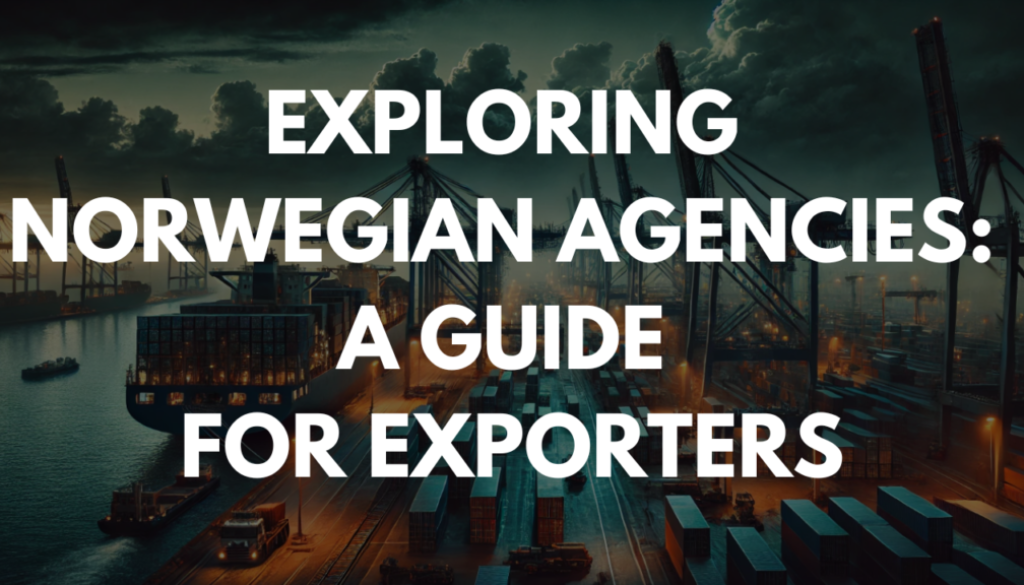Exploring Norwegian Agencies: A Guide for Exporters
Last Updated on 27. Nov 2024 by b2bexport
Venturing into the Norwegian market requires a deep understanding of its commercial landscape and cultural differences.
This is where Norwegian agencies become invaluable, serving as key intermediaries for foreign exporters aiming to penetrate this unique market.
Understanding the Function of Norwegian Agencies and Cultural Differences
Norwegian agencies play a pivotal role in connecting products or services with their target markets.
These agencies are typically divided into two main categories: sales agencies and marketing agencies. Sales agencies focus on direct sales, facilitating the journey of products from suppliers to consumers or retailers. In contrast, marketing agencies are dedicated to generating market awareness and demand. Unlike in-house sales teams, these agencies operate independently, often representing several clients simultaneously. This independence allows them to leverage extensive market knowledge and well-established networks, which are particularly beneficial for foreign exporters.
Norwegian agencies often work with expatriate employees to bridge the gap between foreign exporters and the local market.
The Role and Diversity of Sales Agents
Sales agents are critical components of the global commercial ecosystem, recognized by various titles in different regions.
Sales agents often work within expat communities to better understand and serve the needs of expatriates. In Germany, they are known as “Handelsagent,” in France as “L’agent commercial,” and in Spain as “agente comercial.” Regardless of the title, their primary role remains consistent: representing products or services in the marketplace. In the UK and the USA, “sales agent” or “commercial agent” are the common terms used. The responsibilities of sales agents can differ significantly by country.
Advantages of Partnering with Norwegian Agencies
Foreign exporters benefit immensely from collaborating with Norwegian agencies, gaining access to comprehensive local market insights, consumer behavior patterns, regulatory frameworks, and effective sales channels.
These agencies assist in navigating cultural and legal intricacies, ensuring both compliance and cultural relevance. Norwegian agencies operate across a broad spectrum of industries, including technology, fashion, and food and beverages, and cater to businesses of all sizes, from multinational corporations to small and medium-sized enterprises.
Additionally, they help expatriates adapt to their host country by providing local market insights and support.
Characteristics of Effective Sales Agents and Local Employees
Sales agents distinguish themselves through their autonomy and sector-specific expertise.
They often specialize in particular industries, using their deep knowledge to market a range of related products or services. Their compensation is primarily commission-based, which directly links their earnings to their sales performance, thereby motivating them to maximize sales.
Sales agents are present in diverse industries, including fashion, finance, and construction. In Norway, they play crucial roles, such as introducing new brands in the fashion sector or securing exclusive deals in the construction industry.
Sales agents often collaborate with local employees to leverage their market knowledge and networks.

Strategies for Finding the Right Norwegian Agent or Agency for the Expat Community
When planning to export to Norway or any foreign country, finding the right local agents and partners can be crucial for your business success. Here’s a comprehensive guide on how to leverage various resources to find suitable agents in Norway:
Embassy Assistance:
Embassies often have connections with local businesses and can facilitate introductions.
For exporters, embassies are valuable resources as they can connect you with local trade offices and provide insights into the market. They are also helpful in understanding cultural differences and the business landscape in the host country.

Agenturer.no:
Platform that helps match businesses with suitable Norwegian agents or agencies.
Utilizing such specialized platforms can streamline your search process and connect you with reputable local agents who have the right experience and industry knowledge.
Online B2B Platforms:
Websites like Europages and Norway Exports offer searchable databases of potential partners.
These platforms are excellent for researching and identifying agents or agencies that match your business needs. They provide detailed profiles and contact information, making it easier to find the right connections.
LinkedIn:
Professional networking on LinkedIn can help identify agents with relevant profiles and endorsements.
LinkedIn is a powerful tool for connecting with industry professionals and exploring their experience, skills, and recommendations from others in the field.
Local Trade Associations:
Engaging with local trade associations can provide insights and connections to reputable agents.
These associations often host events, provide market research, and offer directories of their members, which can be invaluable for finding trustworthy partners.
Local Guides:
Utilizing local guides can help navigate the Norwegian market and find suitable agents or agencies.
Local guides can provide on-the-ground knowledge about the business environment, cultural nuances, and other expats’ experiences in the region.
Guide for Exporters:
Moving abroad for a work assignment requires understanding the local culture and business environment.
Resources such as local guides and trade associations can help expatriate employees and expat communities adjust to the new home and deal with the complexities of the host country.
Living Abroad and Finding Comfort:
Expatriates and their families often face challenges when moving to a foreign country.
Understanding cultural differences and finding comfort in the new environment are key to a successful relocation. Engaging with expat communities can provide support and advice on life abroad, education, citizenship, and other essential services.

Research and Determine:
Before relocating, it’s crucial to research and determine the costs, climate, language, and regulations of the new destination.
This helps in maintaining a smooth transition and access to necessary resources, ensuring the move is as seamless as possible.
Success in the Host Country:
Achieving success in a new country involves exploring and understanding the local market, building a network, and navigating local regulations and taxes.
Utilize the advice and resources available from embassies, local trade associations, and online platforms to establish a strong presence and succeed in the global market.
By leveraging these resources and understanding the complexities of the local market, exporters can effectively find and collaborate with local agents, ensuring a successful business venture in Norway or any other foreign country.
Financial Arrangements and Commission Models
Most Norwegian agencies operate on a commission basis, with rates typically ranging from 5% to 15%, depending on the product, industry, and scope of work.
Marketing agencies might adopt a sales-based payment model, aligning their earnings with the sales they generate. Commission models can also vary based on the nature of the work assignment and the specific requirements of the expatriate employees.
Preparing to Collaborate with Norwegian Agencies When Moving Abroad
Thorough preparation is essential before approaching Norwegian agencies.
Exporters should understand their product’s unique selling points and how they align with Norwegian market demands. A clear business strategy, familiarity with local regulations, and an understanding of consumer preferences are crucial.
Additionally, understanding the differences between the home country and the Norwegian market is important to tailor the business strategy effectively.
Crafting an Impactful Presentation
When presenting to Norwegian agencies, clarity and conciseness are paramount. Key considerations for a successful presentation include:
Market Insight: This involves thorough research on the local market, understanding cultural differences, and being aware of local cultures.
Knowing the market dynamics will help you tailor your presentation to meet the specific needs and preferences of Norwegian agencies.
Product Relevance: Highlighting how your product or service aligns with local cultures and meets the needs of the host country is crucial.
Ensure your presentation showcases how your product is relevant and beneficial to the Norwegian market.
Sustainability Practices: Sustainability is a key value in Norway, and demonstrating your company’s commitment to sustainable practices can significantly enhance your presentation.
Discuss how your product or service contributes to environmental conservation and ethical business practices.
Presentation Style: Visual appeal and simplicity in communication are vital for making an impactful presentation. Ensure your slides are visually engaging and your message is concise and easy to understand.
Unique Selling Points: Emphasize the unique features and benefits of your product that differentiate it from competitors.
Make sure to address how these unique selling points cater to the specific needs of the Norwegian market.
Cultural Sensitivity: Demonstrating cultural sensitivity by incorporating local language and values into your presentation can create a positive impression.
This shows respect and understanding of the local culture, which is important when dealing with Norwegian agencies.
Detailed Business Plan: Provide a clear and detailed business plan that includes your approach to entering the Norwegian market, your marketing tactics, and your sales strategies.
This demonstrates your preparedness and commitment to succeeding in Norway.
Proof of Concept: Including real-world examples of your product’s success can build credibility and trust.
Share testimonials from satisfied customers, detailed case studies, and live product demonstrations to showcase the effectiveness and reliability of your offerings.
Logistics and Support: Describe your capabilities in logistics and after-sales support.
Highlight your company’s logistics capabilities and the support services you offer. Demonstrating a robust logistics network and reliable after-sales support can reassure potential partners of your ability to meet their needs efficiently.
Financials: Showcase competitive pricing and financial stability.
Providing clear and competitive pricing information along with evidence of your financial stability can help build confidence in your business. Highlight any financial strengths and stability that can reassure Norwegian agencies of your business’s reliability.
Understanding Local Cultures: Demonstrate an understanding of local cultures to show cultural sensitivity.
Understanding and respecting local customs, traditions, and business practices can significantly enhance your presentation. This includes being aware of cultural differences and showing respect for local values and practices.

Here are some additional tips to keep in mind:
- Guide for Exporters: Utilize this guide to navigate the complexities of presenting in a foreign country and engaging with expat communities and local employees.
- Cultural Differences: Emphasize your awareness and respect for cultural differences in your presentation.
- Local Guides: Mention the use of local guides to help understand and navigate the Norwegian market.
- Taxes: Address any tax implications and regulations that are relevant to doing business in Norway.
- Discover: Encourage Norwegian agencies to discover the unique benefits of your product or service.
Enhancing Digital Presence
A strong online presence is crucial. Ensure your website is professional, up-to-date, and reflects your brand identity. Include testimonials, case studies, and detailed product information.
Having a Norwegian version of your website can be beneficial. Additionally, creating content that resonates with individuals living abroad can significantly enhance your digital presence.
Emphasizing Sustainability
Sustainability is a significant factor in the Norwegian market.
Exporters should be ready to discuss their sustainability practices, including eco-friendly manufacturing and ethical sourcing, to align with market expectations and demonstrate a commitment to global ecological and social responsibilities. Demonstrating a commitment to sustainability practices that benefit the world is crucial.
Conclusion
Exporters looking to succeed in one country like Norway should focus on thorough preparation, understanding cultural differences, and leveraging local agencies and the expat community.
By aligning with local expectations and addressing the unique needs of expatriates, including expatriate employees, exporters can unlock significant opportunities for growth and establish enduring partnerships in the Norwegian market. Understanding the complexities of moving abroad and living abroad is crucial. Engaging with the expat community, expatriate employees, and local employees can help navigate cultural differences and local cultures effectively.
Utilizing local guides and resources in the host country will ease the transition from the home country.
Connecting with other expats and expat communities can provide valuable insights and support. Learning from experiences in other countries, like Spain, Italy, Canada, Japan, Vietnam, and South Korea, can offer additional perspectives and strategies for success. Exporters should also consider the financial and regulatory aspects, including taxes, to ensure compliance and efficient operations.
Establishing a new home in key cities like London, Paris, and cities in Norway will be essential for business success.
Exploring and discovering new opportunities in the global market, from Europe to other destinations, will help exporters stay competitive. By addressing the needs of expatriates and maintaining strong relationships with local partners, exporters can achieve long-term success and make the most of their journey abroad. Finally, considering factors such as education, citizenship, climate, and language will help expatriates and their families find comfort and thrive in their new environment.
With thorough research and strategic planning, exporters can successfully deal with the challenges of relocating and create a positive impact in their new market.




